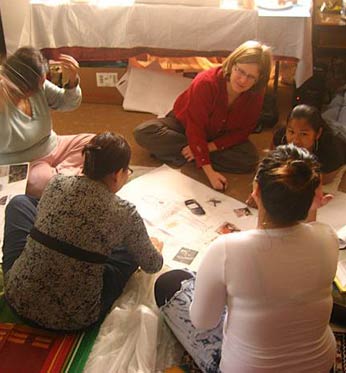Cambodian women in Oakland now have an opportunity to identify and address areas for improvement in their community with the help of CHAA’s new Cambodian Women’s Health Project. Designed to promote wellness in the Cambodian community, the two-year program is co-led by Prevention Research Center (co-lead agency and research partner) and community host partners Center for Empowering Refugees and Immigrants (CERI) and Cambodian Community Development, Inc. (CCDI).
Funded by the National Institute of Health’s National Center on Minority Health and Health Disparities, the project involves a multi-generational group of nine Cambodian women sharing and using their personal experiences to promote healthy behaviors in their community.
"Our goal is to build capacities of the local Cambodian community to assess health issues affecting members and respond proactively, and to build the capacities of scientific researchers to partner with communities," said CHAA Project Supervisor Shadia Merukeb. "Another goal is to work with the community to determine and create a culturally appropriate intervention for an issue that they, as a community, consider important and relevant, as opposed to the way traditional research works."
While the project is still in its early stages, Merukeb has seen increased involvement and project ownership from the participants in just a few weeks.
"They really seem to enjoy having a place to meet and talk about positive change," Merukeb said. "Further, they are interested in making connections with community outside of the designated project time."
Research Assistant Talaya Sin agrees.
"The women are really taking this project to the top," Sin said. "They are so committed, on time, and always on top of things. And ironically, these are women who people would normally be casted as refugees with mental problems."
And while no project is without its challenges, Merukeb is confident in the CHAA team’s ability to work through them.
"The biggest challenge so far has been language," Merukeb said. "The language used to describe Community Based Participatory Research (CBPR) concepts doesn’t always translate smoothly, so we have needed to adjust the English as necessary. It’s certainly been a learning process, and I feel that we are successfully working through it."
The project is also making strides to go beyond isolated health issues, according to CBPR Consultant Ann Rojas-Cheatham.
"This endeavor is very groundbreaking as it has dedicated tremendous resources to CBPR and has committed to mutual learning, co-decision making and social justice," Rojas-Cheatham said. "These two things bring it tremendous potential."
Community Health Worker Sotheavy Tan sees the group’s activities as valuable in not only promoting community health, but also life skills for a minority population as well.
"I think the project has helped empower women by encouraging them to talk about their issues in the community that have an impact on their life," Sotheavy said. "Activities like role playing and skits on alcohol and violence won’t only lead to healthier communities, but will also generate leadership and communication skills for something greater, such as employment."
Despite translation challenges, the team is motivated by the unique and innovative nature of the CBPR model.
"I love the CBPR approach and realize that the real world application can certainly be challenging, but the experience and potential for change is exciting," Merukeb said. "We are dedicated to ensuring that this is a CBPR process and are very honored and excited to be able to work with the Cambodian community in this particular endeavor."
(Photo by Juliet Lee)

